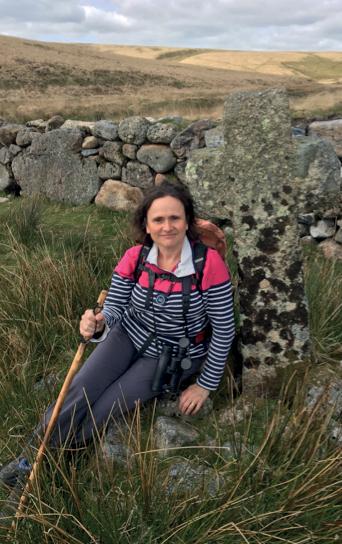
4 minute read
Issue 35: Weathering Change
When Penny Endersby (then Penny Corran, Newnham [1988]) graduated in Materials Science & Metallurgy in 1991 she did not anticipate that by the end of 2018 she would be Chief Executive of the Meteorological Office. As an undergraduate she was sponsored by British Gas and worked for them each summer, twice in marketing and finally on corrosion of heat exchangers for boilers with synthetic flue gas condensate. Following graduation, she continued with British Gas, working on solid oxide fuel cells. She joined the Royal Armament and Research Development Establishment (RARDE) in 1993 and, acquiring a qualification to fire explosives, she developed expertise in so called electric and intelligent armours, which react very rapidly to an attack to minimise its effectiveness. This work involved hydrodynamic modelling of the response of metals to explosions. Slowly but surely she and others began to recognise that she had managerial as well as scientific strengths and in 2009 she became a department manager at the Defence Science and Technology Laboratory (DSTL), an organisation created from RARDE and a number of kindred establishments.
At DSTL her focus moved to cyber security and in 2015 she became head of the Cyber and Information Division of DSTL, later becoming Acting Chief Technical Officer. Along with honing her managerial skills this provided significant background in highlevel computing, important preparation for her (then unanticipated) move to the Met Office. One of her early achievements there has been to win funding for a new super-computer. This will enhance the Met Office’s use of advanced mathematical modelling techniques which use very large amounts of data to increase the accuracy of weather forecasts. With ever-increasing understanding of the processes underlying global weather the principal model is upgraded two or three time a year. The new supercomputer will also enable the Met Office Hadley Centre to continue to investigate the potential consequences of climate change by developing and using models that look very much further ahead than the coming weeks. Acquiring data for predicting the weather, be it tomorrow or in a century, involves collaboration with colleagues around the world and the Met Office is a major player on the global meteorological stage. Overseeing the smooth running of this essential activity is just one of Penny’s many duties and in this connection she is the UK’s Principal Representative to the World Meteorological Organisation. Within the Met Office she is seeking to develop a unifying strategy focusing on ends, not means, giving the Office a new purpose “helping you to make better decisions to stay safe and thrive”, which necessitates always thinking about what the users of their forecasts are going to do when they receive them. Another of her aims is to increase the diversity amongst Met Office personnel in respect of numbers of women and numbers of BAME staff. As in her previous leadership roles, alongside these aims she will seek to create “conditions wherein scientists and scientific excellence can thrive”. She also recognises that encouraging people to aim high carries with it a responsibility to advise about possible failure. One great change in moving to the Met Office that she aims to exploit is that public engagement about the organisation’s work is encouraged.
Advertisement
Looking back on her undergraduate days Penny recalls that perhaps the greatest shock was having to tackle questions for which there was no “right answer” and she regrets the lack of encouragement for women to learn about becoming leaders, a lacuna she has impressively overcome. She has an on-going connection with Cambridge as an Honorary Associate of Newnham College. The Associates, who become “Honorary” after completing ten years in post, offer members of the College help in a range of ways including advice about careers or arranging work-shadowing. She is also a member of a group of the Associates who are advising the College on ways in which it can contribute to the University’s overall Cambridge Zero target. A Royal Academy of Engineering Visiting Professorship of Electronics and Computer Science at the University of Southampton provides another connection with the academic world. In addition, as part of her work at Southampton, she is a mentor for the university’s start-up incubator Future Worlds, for which her experience as a nonexecutive Director of Ploughshare, the MoD’s technology transfer organisation, is particularly helpful. Between academia and the wider world she has served a stint on the Council of the Institute of Physics.
Penny is married to Alastair (Corpus Christi [1987]), a History teacher, whom she met on her first summer vacation job with British Gas; they have two children of university-age, both keenly musical. As the photograph illustrates, she greatly enjoys outdoor activities including walking on Dartmoor - for which accurate weather forecasts are highly desirable! Her interest in wildlife, especially birds, and the response to seasonal and climatic variations, was one of several factors that attracted her to the Met Office job; its location in Exeter provides an excellent base. It also led to her becoming a trustee of the Wiltshire Wildlife Trust. A much enjoyed indoor activity is choral singing, not least as a volunteer in Exeter Cathedral.
In short, notwithstanding the highly competitive application process, she describes her (inevitably demanding) Met Office job, as fulfilling many of her criteria: “the perfect job at the perfect time”.

Penny Endersby





